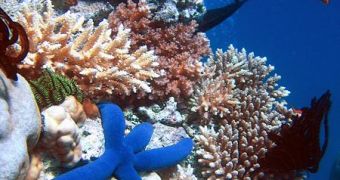Over the past few years, global warming and climate change woes have made engineers think of new and innovative solutions of preventing the planet's temperature from going up, endangering or forcing to go extinct countless species in the process, alongside billions of humans. One of the proposed solutions was injecting the atmosphere with particles that would ensure a significant drop in global temperatures, of up to a few degrees Fahrenheit. A new study from the Carnegie Institution shows that this would have little effect on preventing the demise of coral reefs worldwide.
The main culprit for the disastrous state reefs are now in is man-produced carbon dioxide, which is being pumped in the atmosphere at billions of tons per year. With more than 70 percent of the planet covered in oceans, it makes sense that they are the biggest CO2 removers, cleaning the atmosphere of the polluting gas, soaking it up, and storing it under the ocean floor.
However, as humans send more and more of the gas into the air, the oceans are beginning to reach a point where their very own pH is in danger. A few years ago, scientists warned that, if we maintained our present pollution course, the oceans would go acidic in a short time.
No one bothered to listen to them, and, so, here we are, years later, witnessing that their predictions were true. Reefs around the world are dying, or are in deplorable condition, and the increasing temperatures are not too responsible for that. The acidity levels in the world's oceans, influenced when CO2 combines with water and generates carbonic acid and hydrogen ions (H+), has been constantly increasing since the onset of the Industrial Age.
As for the geoengineering solutions, “There would be a slight reduction in this problem, because land plants would be expected to be able to grow more vigorously in a high CO2, but cool world. However, this expansion of the land biosphere, while it's a slight help to ocean acidification is not enough to make a big difference,” Carnegie Institution Department of Global Ecology expert Ken Caldeira, who is also the co-author of the study that presented the discovery, explains. He says that the amount of CO2 plants would draw from the atmosphere would be insufficient to prevent ocean acidification.
“Geoengineering approaches come with all sorts of risks. It is important we learn about the full set of these risks and all of their implications. One of the good reasons to prefer CO2 emissions reductions over geoengineering is that CO2 emissions reductions will protect the oceans from the threat of ocean acidification, whereas these geoengineering options will not,” the expert adds.

 14 DAY TRIAL //
14 DAY TRIAL //